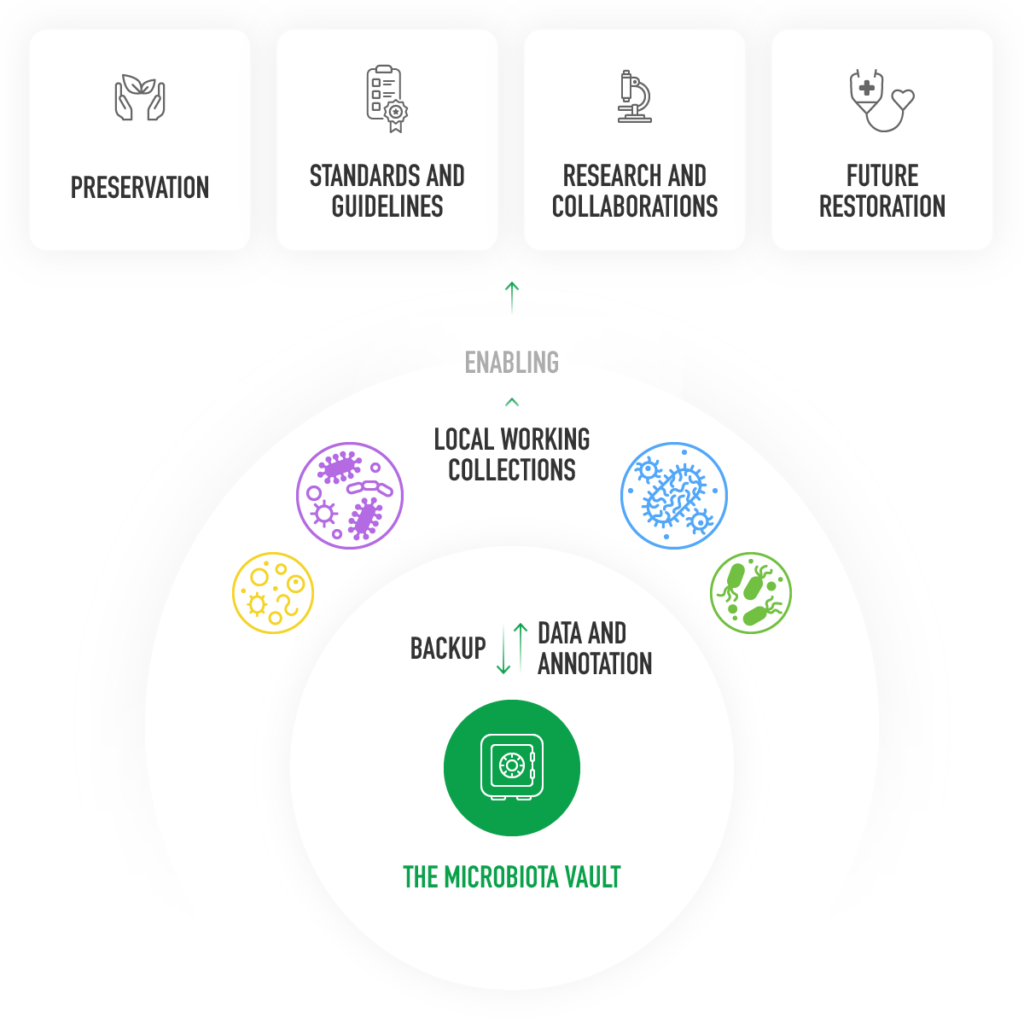
to conserve long-term health for humanity.

Microbial diversity is threatened
Microbial diversity is globally threatened by urbanization and environmental change proceeding at an unprecedented pace (1, 2). In analogy to the Svalbard Global Seed Vault, the Microbiota Vault initiative sets out to preserve the biodiversity of human-associated microbiota, while still possible, by constructing an institution for the safe storage and preservation of microbiota samples and collections. The Microbiota Vault will closely interact with local working collections all over the world.
A global ecosystem
supporting One Health
Collect. The Microbiota Vault closely interacts with local collections and research efforts all over the world.
Preserve. The Microbiota Vault acts on behalf of the local working collections, providing safe backup storage and a framework for data services and collaboration.
Enable. The Microbiota Vault empowers the research of the local working collections, helps set protocols and standards, preserves the biodiversity of microbiota, and allows future restoration of health.
Thus, the Microbiota Vault supports One Health.


Conceptualizing the Microbiota Vault
The feasibility study found that the Microbiota Vault initiative has great significance and potential. It was supported by non-profit institutions and universities active in the field of the human gut microbiome, such as the Swiss Gebert Rüf Foundation along with the Seerave Foundation, the Calouste Gulbenkian Foundation (Portugal), Rutgers University (USA), Kiel University (Germany), Canadian Institute for Advanced Research (Canada), Bengt E. Gustafsson symposium foundation (affiliated to Karolinska Institutet, Sweden) and UC San Diego School of Medicine (USA).

Initiation of the operational phase
The Microbiota Vault initiative has decided to initiate the operational phase of the project in Switzerland and has designed a program for a two-year launch phase.
For the execution of the launch phase, the Microbiota Vault initiative collaborates with a science team from the University of Basel, University of Lausanne, ETH Zurich, and Rutgers University.
Track our latest developments
-

2023
Deposits initiated for 5 human gut microbiome collections (from Brazil, Ethiopia, Laos, Ghana, Switzerland) and for 4 collections of fermented food microbiomes (Benin, Ghana, Laos, Thailand)
-

2023
3rd Global Microbiome Network – GloMiNe – Symposium for Asia
-

2022
Extension to the collection and characterization of fermented food microbiomes, supported by The Rockefeller Foundation and in collaboration with the Periodic Table of Food Initiative (PTFI)
-

2022
2nd Global Microbiome Network – GloMiNe – Symposium for Africa
-

2021
Start of the Launch Phase of the Microbiota Vault, in collaboration with ETH Zurich, University of Basel and University of Lausanne and Rutgers University. -

2021
First Latin American Symposium of the global microbiome network. A multidisciplinary team of local and foreign experts discussed the importance of conservation. -

2020
Publication of the Microbiota Vault feasibility study, verifying the soundness of the concept and conceptualizing how to launch and scale the initiative.
-

2019
The Microbiota Vault Inc. was founded as a non-profit organisation with the aim of safeguarding microbial diversity by supporting collection efforts and creating an institution for safe preservation.
-

2018
The rationale around the Microbiome Vault initiative was published in Science